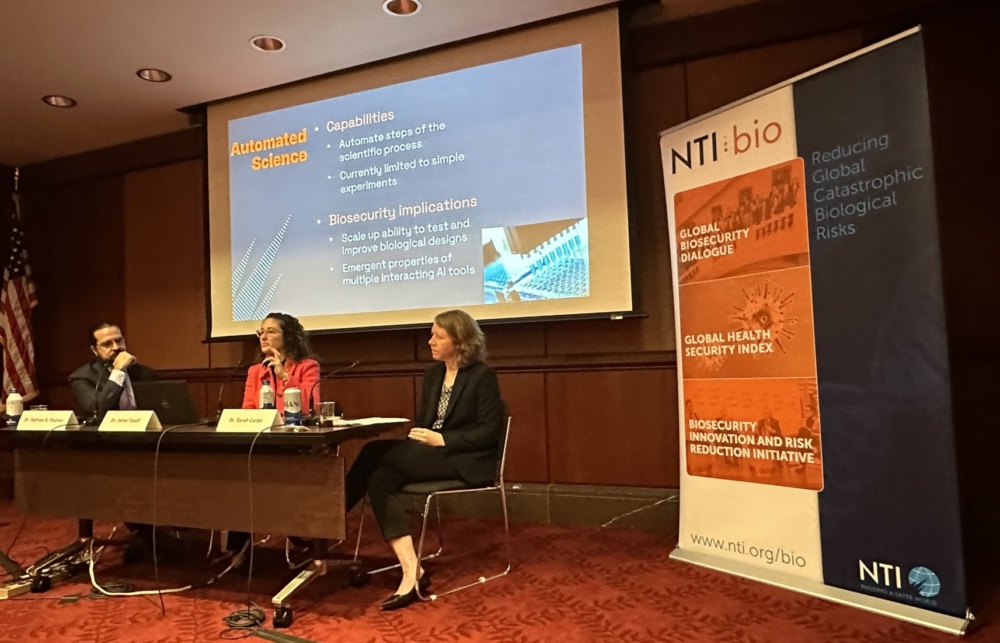
NTI | bio Expert Calls on U.S. House Leaders to Prioritize Biosecurity
NTI | bio Senior Fellow Jaime Yassif, Ph.D., called on government leaders to take urgent steps to prevent future catastrophic biological events during a Dec. 8, 2021 hearing.
In March 2021, NTI partnered with the Munich Security Conference to host a tabletop exercise on reducing high-consequence biological threats. Convened virtually, the exercise included 19 senior leaders and experts from across Africa, the Americas, Asia, and Europe with decades of combined experience in public health, biotechnology industry, and international security. Our goal in designing the exercise was to draw attention among senior global leaders to the urgent need to improve international capabilities to prevent and respond to pandemics. The exercise was designed around a fictional scenario portraying a global pandemic involving an unusual strain of monkeypox virus that first emerged in the fictional country of Brinia and subsequently spread globally.
Following the recent detection of monkeypox cases across multiple countries, NTI’s report on the exercise has appeared in a number of social media outlets, noting that the associated fictional scenario featured a monkeypox outbreak with a start date that roughly coincides with the current, ongoing outbreak. Some social media activity has included disinformation about our exercise, and we would like to set the record straight.
We have provided below answers to Frequently Asked Questions to offer additional information on our exercise, dispel unhelpful rumors and disinformation, and describe our work to strengthen biosecurity and pandemic preparedness in countries around the world.
A tabletop exercise is a scenario-based, facilitated discussion that uses a fictional story to stimulate dialogue among practitioners and experts and to highlight key issues that need to be addressed, with the aim of gaining valuable insights about effective approaches for solving difficult problems. They are frequently used by a range of professions to prepare for worst-case scenarios.
The 2021 NTI-MSC tabletop exercise was specifically designed to raise awareness among experts and leaders about high-consequence biological risks, to highlight gaps in global biosecurity and pandemic preparedness capabilities, and to help identify solutions and concrete actions that leaders can take to address these vulnerabilities.
The NTI-MSC 2021 tabletop exercise was the third in a series of annual joint exercises designed to draw high-level international attention to the urgent need to bolster biosecurity and pandemic preparedness in countries around the world. NTI and MSC have continued to partner in convening these exercises because we have found them to be an effective tool for raising awareness among senior leaders about the broad range of biological risks that the international community faces—and for encouraging outside-the-box thinking about effective ways to build new systems that can more effectively prevent and respond to potential future catastrophic biological events.
The NTI-MSC 2021 exercise built on previous exercises convened in 2019 and 2020 to examine gaps in national and international biosecurity and pandemic preparedness and to identify concrete actions that leaders can take to improve capabilities to prevent and respond to future high-consequence biological events. Specifically, the exercise was designed to provide an opportunity for participants to:
The fictional scenario in our exercise involved a hypothetical engineered strain of monkeypox virus, which was more transmissible and more dangerous than natural strains of the virus, and which spread globally—eventually causing more than three billion cases and 270 million deaths over a period of 18 months. We have no reason to believe that the current outbreak involves an engineered pathogen, as we have not seen any compelling evidence that would support such a hypothesis. We also do not believe that the current outbreak has the potential to spread as rapidly as the fictional, engineered pathogen in our scenario or to cause such a high case fatality rate.
According to public health experts, the current outbreak involves the West African strain of the monkeypox virus, which has historically had a case fatality rate of up to one percent, and considerably lower in countries with robust public health systems. The current monkeypox virus is spreading in countries where it has not typically been found in the past, and public health experts are currently examining the virus to better understand what is causing its spread.
NTI designed a fictional scenario for our exercise to create an opportunity for participants to discuss urgently needed improvements in global capabilities to prevent and respond to pandemics. For the exercise design, we wanted to select a pathogen that would be a plausible fit for our scenario, and we chose monkeypox from a range of options offered by our expert advisers.
One of the factors in selecting monkeypox was the value of selecting a pathogen with different features than the SARS-CoV-2 virus, which encouraged exercise participants to consider issues beyond those that have already been highlighted by the current pandemic.
The fact that several countries are currently experiencing an outbreak of monkeypox is purely a coincidence. The key takeaway from our exercise is not the specific pathogen in our fictional scenario; it’s the fact that the world is woefully unprepared to guard against future pandemics, and that we need to take urgent action to address this vulnerability.
The risks posed by monkeypox have been well documented for years by multiple public health authorities; the information in our fictional scenario is not new. For example, according to the World Health Organization, Nigeria has been experiencing a monkeypox outbreak since 2017 with 218 cases. In 2021, monkeypox cases were also identified in the United Kingdom and the United States. Monkeypox is also listed on the U.S. Select Agents and Toxins List given its potential to pose a severe threat to both human and animal health. According to the U.S. Centers for Disease Control and Prevention the virus was discovered in 1958 during two outbreaks in colonies of monkeys that were maintained for research.
Discussion among tabletop exercise participants led to the following key findings:
The report, which summarizes the exercise and shares key findings and recommendations, can be found here.
The Nuclear Threat Initiative is a nonprofit, nonpartisan global security organization focused on reducing nuclear and biological threats imperiling humanity.
NTI recognizes that preventing and mitigating biological risks is a critical part of our work to build a world safe from preventable global catastrophe.
Our NTI | bio work—including our annual tabletop exercises in partnership with the Munich Security Conference—is focused on reducing biological threats globally by fostering new thinking, testing solutions, and advocating for systemic change. The NTI | bio team has a variety of ongoing projects focused on reducing catastrophic biological risks, strengthening biosecurity and pandemic preparedness, and driving progress in advancing global health security.
Sign up for our newsletter to get the latest on nuclear and biological threats.
NTI | bio Senior Fellow Jaime Yassif, Ph.D., called on government leaders to take urgent steps to prevent future catastrophic biological events during a Dec. 8, 2021 hearing.
NTI | bio convened a workshop on “Disincentivizing State Bioweapons Development and Use” a week ahead of the Biological Weapons Convention Working Group meetings in Geneva, Switzerland.
NTI | bio hosted a lunchtime event on Capitol Hill to discuss how Congress and other decisionmakers can take action to mitigate emerging risks associated with AI-bio capabilities.


